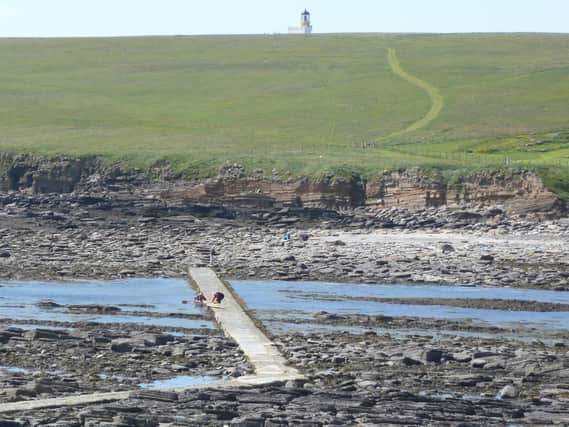Scottish islanders around the world answer call for huge Viking DNA test


Professor Jim Wilson, lead researcher for the Viking II project at Edinburgh University, said volunteers had come from Anchorage in Alaska, Dunedin in New Zealand, South Africa, Finland and Florida, among other places, as well as from the Northern Isles, the Scottish mainland and England.
He said the response so far had been 'amazing' with more volunteers required.
Advertisement
Hide AdAdvertisement
Hide AdProf Wilson said: "People from Orkney and Shetland are generally very altruistic. They have a great pride in where they come from and they are very proud of their Viking heritage. They are extremely interested in their Viking heritage," he said.
It is hoped that 4,000 people will take part in the study which uses the unique gene pool in the Northern Isles - where the ancestry is roughly 25 per cent Norse - to understand conditions such as diabetes, stroke, heart disease, cancer and multiple sclerosis.
Prof Wilson, who is originally from Orkney, said research had show that, in some cases, genetic variants could be 150 more times more common on the islands than anywhere else.
For example, research has found that the genetic variant for Long QT syndrome, which leads to an arrhythmia in the heart and possible cardiac arrest, was more common among people in the Shetland Isles.
An early study of the team also found that Orkney had the highest incidence of Multiple Sclerosis in the world, with Prof Wilson involved in ongoing research to determine whether the disease has a genetic link.
He said Orkney and Shetland provided a valuable pool of genetic information given the small number of 'founders' of the population.
He said: "The Vikings arrived 1100 to 1200 years ago and since then a lot of Scottish people have moved there since.
"In Orkney, there were probably 1,000 or 2,000 people who were founders of the population so all the genes and all the variants come from that same number of people because they have generally married into their own.
Advertisement
Hide AdAdvertisement
Hide Ad"Quite a number of the people there today will descend from these men and women, these founder members of the population."
He said early results from tests involving an initial group of 4,000 islanders suggested that some exceedingly rare diseases and illnesses were potentially more commonly found in Orkney and Shetland when compared to the rest of the world, but added that results were yet to be finalised.
Prof Wilson added that he did not believe that Dupuytren's disease, which can lead to a bending back of the fingers due to a contraction in hand tissue, was linked to Viking DNA, as is commonly thought.
"There is no evidence to suggest a Viking link. I am happy to be proved wrong but, if it was linked to the Vikings, you would have high rates of it in Norway and in Iceland. That is not the case. It is a North European disease," he added.
Those taking part of the study, who must have two grandparents from Orkney or Shetland, will post a saliva sample to the researchers which will then undergo analysis, including genetic sequencing.
For those living in the UK who volunteer to be part of the study, volunteers can choose to have information onlimited genetic results returned to them through the NHS.
This information could be useful in terms of their future healthcare, including taking preventive actions to reduce the impact of health conditions.
Prof Wilson added: “Adding 4,000 more volunteers from these special populations will increase the scope and impact of our research into the genetics of health and disease.
Advertisement
Hide AdAdvertisement
Hide Ad"We hope in the long term, this will bring us a better understanding which is the basis of new approachesto treat or prevent disease.”
The study also involves the University of Aberdeen and NHS Grampian clinical genetics doctorsProfessor Zosia Miedzybrodzka and Dr John Dean, who have been holding clinics in Shetland andOrkney for over 20 years.
Professor Miedzybrodzka said: “Better understanding the genetics of the Northern Isles will lead to betterhealth care in the long run, both directly to the islanders but also worldwide”.
People who would like to take part can register their interest by visiting the study website:www.ed.ac.uk/viking.